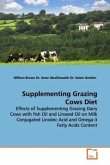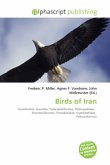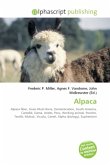High Quality Content by WIKIPEDIA articles! Grazing generally describes a type of predation in which a herbivore feeds on plants (such as grasses), and also on other multicellular autotrophs (such as algae). Grazing differs from true predation because the organism being eaten is not killed, and it differs from parasitism as the two organisms do not live together, nor is the grazer necessarily so limited in what it can eat (see generalist and specialist species). Many small selective herbivores follow larger grazers, who skim off the highest, tough growth of plants exposing tender shoots. For terrestrial animals grazing is normally distinguished from browsing in that grazing is eating grass or other low vegetation, and browsing is eating woody twigs and leaves from trees and shrubs. Grazing is important in agriculture, in which domestic livestock are used to convert grass and other forage into meat, milk and other products. The word "graze" derives from the Old English (OE) grasian, "graze", itself related to OE graes, "grass".
Bitte wählen Sie Ihr Anliegen aus.
Rechnungen
Retourenschein anfordern
Bestellstatus
Storno








